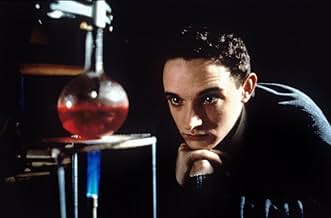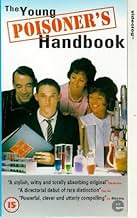This film is based on a true story about a British teenager who allegedly poisoned family, friends, and co-workers. Graham is highly intelligent, but completely amoral. He becomes interested... Read allThis film is based on a true story about a British teenager who allegedly poisoned family, friends, and co-workers. Graham is highly intelligent, but completely amoral. He becomes interested in science, especially chemistry, and begins to read avidly. Something of a social misfit... Read allThis film is based on a true story about a British teenager who allegedly poisoned family, friends, and co-workers. Graham is highly intelligent, but completely amoral. He becomes interested in science, especially chemistry, and begins to read avidly. Something of a social misfit, he is fascinated by morbid subjects such as poisons and murder. His family environment i... Read all
- Awards
- 1 win & 2 nominations total
- Director
- Writers
- All cast & crew
- Production, box office & more at IMDbPro
Featured reviews
One of the Best Sleepers
Be careful who's making your cuppa...
Black comedy near its best
This is pitch black British comedy near its best, reminiscent of both Hitchcock and 'A Clockwork Orange' -- its three-part structure is similar to that of 'A Clockwork Orange,' given that the protagonist is free, then confined, then free again to illustrate the vanity of "rehabilitation" where it concerns psychopaths, and we even hear excerpts from Purcell's Funeral Music for Queen Mary, which Wendy Carlos incorporated into her electronic score for 'Clockwork.' Whether 'The Young Poisoner's Handbook' is paying homage or borrowing, the movie itself is a highly individual work that should please anyone with a fondness for Orwell or Ealing.
Hugh O'Conor, with his wide-eyed gift for simulating innocence, is an ideal selection for the role of Graham Young, the real-life poisoner of the British village of Bovingdon, who slowly poisoned his stepmother to death with antimony sulfide, finishing the job with thallium. Cursed with a banal home life and a sociopathic mind, his self-described "gift for chemistry" is put to obviously nefarious uses, occasionally using friends as guinea pigs before the main attraction.
The director, Benjamin Ross, makes a tremendously impressive debut here. His selection of music together with his fluid editing and camera-work often produce stirring and exciting results, the 1960s small British town setting keenly observed, with a very black wit. Graham's wicked stepmother, played by the singular Ruth Sheen (seen in many Mike Leigh films), joyfully accepts her first dose of poison after finding a box of Velvet Victories chocolates on her bedroom pillow, with a note reading "To my darling mother, xxxx." There's a vivid sense of the dustiness of the Young household, the darkness of Graham's bedroom punctured by the eerie glow of his flasks, the frustration of an overcrowded working class household where the telly's always running with the silliness of popular variety programs. The film also adroitly contrasts the self-important grandeur of Young's genocidal ambitions with the unglamorous pettiness of the actual crimes and the prosaic Bovingdon environment to which his perpetration of them was fortunately limited (the real Graham Young had wanted to be known as "The World's Poisoner," but was instead given the considerably less flattering moniker "The Teacup Poisoner"). Absurdity and grimness are very skillfully balanced. A marvelous, overlooked film.
Dark and amusing but not to all tastes
I first saw this in the cinema many years ago and held off writing a review because I wanted to be sure that I could give it a fair review memory not that great you know. So I watched it on channel 4 last week and was quite taken aback I didn't remember it being quite that dark and disturbed. The plot is quite like Kind Hearts & Coronets in the set up and delivery (more in the delivery) but is a lot darker and more cruel than that classic. The comedy is of the very dark type and mostly comes from Graham's narration. His narration plays his acceptance of very shocking events as run-of-the-mill things that happen in the background, this juxtaposition works well and makes it funny.
The actual poisonings are not always easy to laugh through, while some of his mother's ordeal is played for laughs, most of it is quite cruel and upsetting. I think it worked well for playing the audience on the fact that we didn't quite know what this was it was based on a true story yet was played for laughs as well as serious at times. However this same ploy is to it's weakness as it is difficult to settle into for this same reason. The director seems very assured and handles this better, mixing inappropriate music with the action as well as directing it very flat and clinically.
O'Conor is the perfect choice for the role. Onscreen he is cold and cruel but it is his narration is where he excels delivering perfectly deadpan lines. The support cast are all OK but mostly play exaggerated characters on the whole British stereotypes and such. The film wisely leaves them as undeveloped this because if we cared too much for them or related to them then it would have been impossible to feel anything but revulsion for Graham. As cardboard cutouts they seem less than Graham in terms of the film (wonder how the real victims' families felt about this view).
Overall this is a strange film but one that has enough going for it to be worht watching. However it should be noted that it is quite cruel and upsetting we are not allowed to feel anything for Graham's victims. The humour is rarely laugh out loud funny and this will probably only be for those who like their comedy very dark.
Twisted and original!
I shudder to think how this plot and characters would have been handled in a mainstream Hollywood movie! I can just see Leo or Toby in the lead role, an "explanation" for his psychotic behaviour, and an uplifting, heart warming happy ending. Thankfully Benjamin Ross has a more unique vision, and he has given us a movie that will stay with you for years to come. 'The Young Poisoner's Handbook' is fantastic!
Did you know
- TriviaThe film was not screened at many local cinemas, due to the tone of the film, and out of respect for the surviving victims, and the relatives of the dead.
- GoofsWhen Dr. Zeigler visits the institution for mentally unstable criminals in which Graham is hospitalized, the director of the institution says, referred to another patient: "Vulpes pilum mutat, non mores", saying it means "The leopard never changes his spots". Graham corrects him, saying it means instead: "The wolf changes its fur, but not its nature". Actually, "vulpes" means "fox".
- Quotes
Graham Young: I want to be the greatest poisoner the world has ever seen.
- How long is The Young Poisoner's Handbook?Powered by Alexa
Details
- Release date
- Countries of origin
- Language
- Also known as
- Den unge giftmördarens handbok
- Filming locations
- 49 Warren Road, Neasden, Brent, London, England, UK(Young family home)
- Production companies
- See more company credits at IMDbPro
Box office
- Gross US & Canada
- $536,825
- Gross worldwide
- $536,825
- Runtime
- 1h 39m(99 min)
- Sound mix
- Aspect ratio
- 1.66 : 1





































